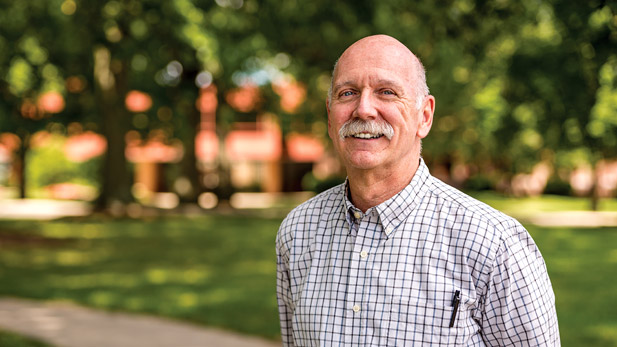Moore Always Keeps Learning & Listening

Dan Moore played key roles in innovating the electrical and computer engineering program’s design sequence, expanding student international educational opportunities and encouraging students’ entrepreneurial mindset.
Dan Moore may have always been at the head of the class as an educator at Rose-Hulman, but the veteran electrical and computer engineering professor also has joined students in a commitment to lifelong learning.
That’s why in the twilight of his career, Moore spent a year as a senior adviser with the State Department’s Office of the Science and Technology Adviser to the Secretary, through the Institute of Electrical and Electronic Engineers’ government fellows program. In this role, he was a member of a federal subcommittee that coordinated science, technology, engineering, and mathematics (STEM) education initiatives, helped policymakers understand and appreciate STEM-related issues, and represented the United States at global STEM education conferences and meetings.
“I tell my classes at the start of each term, ‘I have always learned something new from my students and colleagues,’” says Moore, retiring this spring after 24 years on the Rose-Hulman faculty. “I share that I have had one of the best jobs, getting paid to continue learning.”
Then, he pauses before passing along another nugget of wisdom to others: “Do not waste the opportunity to keep learning.”
With colleagues and department leaders, Moore developed a unique and different senior-year design sequence that ignited an entrepreneurial mindset among students and forged strong partnerships between Rose-Hulman and industry. He redesigned the junior-year design course to emphasize ethical design, engineering codes of conduct, and general ethical issues while encouraging students to become community problem solvers. The first-year design course used Lego robotics systems to introduce students to elements of design, programming, teamwork, and communications that would become the foundation of their educational careers.
“I believe our design sequence prepares students for many of the ‘real world’ issues they confront when they go to work in internships, co-ops, and full time,” he says. “I have enjoyed watching the teams really grow and stretch by following through on what the instructors told them on the first day of class: ‘This is your project, your success is based on your work individually and as a team.’”
Those lessons have been appreciated by Moore’s former students. One manager of a global electronics company returned to campus to thank the educator for “firing” a student team after the fall academic quarter for failing to meet project milestones or a client’s expectations.
“The (alumnus) went on to tell me that was one of the best learning experiences of his career. We had held him accountable for his lack of effort, and he made sure it never happened again,” said Moore, who spent part of his tenure as associate dean of faculty. “The best aspect of teaching at Rose-Hulman, without a doubt, has been the students and their active participation in the learning process. I have been fortunate to interact with the students, not just academically but also in extracurricular activities, and having personal discussions about career paths, short- and long-term goals, and general interpersonal dialogues. I did most of the listening.”
Another career highlight for Moore was being faculty adviser for the Solar Phantom solar-powered car team on several of its cross country journeys, including a third-place finish in Sunrayce 1999 (from Washington, D.C., to Orlando, Fla.).
Moore also helped expand international opportunities and programs with institutions in South Korea, Sweden, Brazil, and Germany, including the dual master’s degree with the University of Applied Sciences in Ulm, Germany. He organized and directed the Lilly Endowment Inc.-supported Engenius Solutions program to encourage student discovery of marketable and commercial enterprises.
And, of course, Moore supported the establishment of the institute’s Center for the Practice and Scholarship of Education to help faculty develop improved teaching techniques.
Always learning.